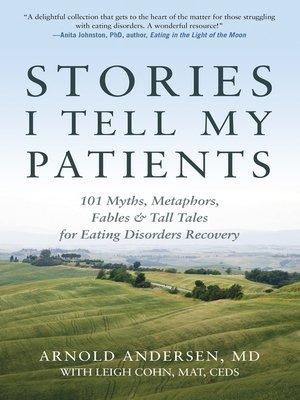Stories I Tell My Patients
ebook ∣ 101 Myths, Metaphors, Fables and Tall Tales for Eating Disorders Recovery
By Arnold Andersen

Sign up to save your library
With an OverDrive account, you can save your favorite libraries for at-a-glance information about availability. Find out more about OverDrive accounts.
Find this title in Libby, the library reading app by OverDrive.



Search for a digital library with this title
Title found at these libraries:
| Library Name | Distance |
|---|---|
| Loading... |
“Stories I Tell My Patients" by Arnold Andersen, MD has been an intermittent feature in Eating Disorders: The Journal of Treatment and Prevention from 1993 to 2015. The complete set of 101 stories is collected here in one volume for the first time. Combining myth, metaphor, fable, tall tale, and inventive fantasy, they were originally intended for professionals treating eating disorders to read and share with their clients, though they can also be read and appreciated by individuals in recovery and their loved ones.
An eclectic mix, Arnold's stories are both entertaining and insightful. Some are vaguely familiar—with his own peculiar interpretations—such as the retelling of “The Emperor Has No Clothes" or Faustian deals with the devil; and, Jack and Jill appear, but instead of rolling down a hill, they are canoeing down a rapid river. There are knights in shining armor, time machines, intergalactic travelers, stories derived from Greek mythology, anorexic saints of the 16th century, and current events (a few of which may seem dated, like Hurricane Floyd or top baseball salaries of five million dollars). Most of the stories sprang from Arnold's imagination, and many were inspired by his direct interactions with patients. He introduces such characters as Tom, Dick, and Harry going camping, Muffy and Buffy sitting in judgment, and Clip and Clop plowing a field. Inanimate objects such as buoys and thermometers carry on conversations, and descriptions of Paris reflect the author's love of that beautiful city.
Storytelling is not meant ultimately to cure eating disorders, but rather to get attention, to convey an idea, to instill a seed, to shake a complacency. No matter how old we get, we can relate to roses and bike trips, shadows and catsup.
An eclectic mix, Arnold's stories are both entertaining and insightful. Some are vaguely familiar—with his own peculiar interpretations—such as the retelling of “The Emperor Has No Clothes" or Faustian deals with the devil; and, Jack and Jill appear, but instead of rolling down a hill, they are canoeing down a rapid river. There are knights in shining armor, time machines, intergalactic travelers, stories derived from Greek mythology, anorexic saints of the 16th century, and current events (a few of which may seem dated, like Hurricane Floyd or top baseball salaries of five million dollars). Most of the stories sprang from Arnold's imagination, and many were inspired by his direct interactions with patients. He introduces such characters as Tom, Dick, and Harry going camping, Muffy and Buffy sitting in judgment, and Clip and Clop plowing a field. Inanimate objects such as buoys and thermometers carry on conversations, and descriptions of Paris reflect the author's love of that beautiful city.
Storytelling is not meant ultimately to cure eating disorders, but rather to get attention, to convey an idea, to instill a seed, to shake a complacency. No matter how old we get, we can relate to roses and bike trips, shadows and catsup.







